| Srl | Item |
| 1 |
ID:
147804
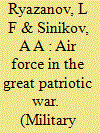

|
|
|
|
|
| Summary/Abstract |
The authors assess and analyze events of the Great Patriotic War involving aviation. The article shows how views on employing the Air Force in warfare changed, and highlights the role of the battle for air superiority.
|
|
|
|
|
|
|
|
|
|
|
|
|
|
|
|
| 2 |
ID:
086596
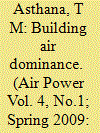

|
|
|
|
|
| Publication |
2009.
|
| Summary/Abstract |
Air Marshal T. M. Asthana, PVSM AVSM VM (Retd) has addressed the issue of what he terms as having come round a "full circle" from command of the air-to-air superiority to favourable air situation and now air dominance as the prime objective of air forces. This is now increasingly accepted by ground forces as a virtue that air power has to earn if the war is to be won. The challenge now much more is how to build air dominance in relation to hostile air forces that may even possess superior numbers and/or technological advantages.
|
|
|
|
|
|
|
|
|
|
|
|
|
|
|
|
| 3 |
ID:
093971
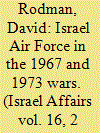

|
|
|
|
|
| Publication |
2010.
|
| Summary/Abstract |
The Israel Air Force (IAF), according to conventional wisdom, constituted the decisive element in Israel's victory in the 1967 Six Day War, but had much less of an impact on the state's triumph in the 1973 Yom Kippur War. The present article takes issue with this line of thinking, contending that, while the IAF's contributions to the Israeli victories in both wars were quite significant, airpower actually was more important in the latter triumph, but not decisive in either one. The article reaches this conclusion through an in-depth comparison of the IAF's accomplishments (or lack thereof) in both wars.
|
|
|
|
|
|
|
|
|
|
|
|
|
|
|
|
| 4 |
ID:
190443
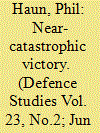

|
|
|
|
|
| Summary/Abstract |
The Israeli’s lightning quick victory of June 1967, in the Six Day War, obscured serious deficiencies in Israel’s military strategy. The Israeli Air Force’s (IAF) dependence on a preemptive strike had cost Israel an essential ally and military arms supplier in France. The false assumption that political support would again be forthcoming for a pre-emptive strike was exposed six years later, in the Yom Kippur War. The U.S. military would take lessons from the Yom Kippur War on the lethality of modern battle but observations of the changing character of modern warfare were available in the Six-Day War.
|
|
|
|
|
|
|
|
|
|
|
|
|
|
|
|
| 5 |
ID:
114824
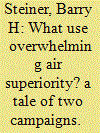

|
|
|
|
|
| Publication |
2012.
|
| Summary/Abstract |
Longer wars between mismatched opponents often end with the militarily weaker side showing unexpected strengths. This article tests this tendency in two short wars in which overwhelming force superiority was applied in massive air attacks. Operation Enduring Freedom (the 2001 American campaign in Afghanistan) and Operation Cast Lead (the 2008-2009 Israeli campaign in Gaza) both began with air offensives that shifted to air-supported ground combat, but Enduring Freedom (a Type A operation) gave priority to aerial attack, while in Cast Lead (Type B) air operations primarily paved the way for ground combat. Neither campaign was fully decisive, suggesting that the residual capabilities of weaker combatants apply to short as well as protracted hostilities. The Type A attack was decisive against the Taliban, but not against al Qaeda. The more intensive Type B case, Cast Lead, did not lead to greater decisiveness than its counterpart, with Israel emphasizing force demonstration to enhance deterrence of attack, yet not seeking to destroy Hamas's residual military capability. The problem of translating large military superiority into decisive war results is also evident recently in more common, stretched out, and restrained airpower use supporting higher-priority ground combat, as in NATO's 2011 intervention in Libya and the aerial drone campaign in Pakistan supporting NATO war making in Afghanistan.
|
|
|
|
|
|
|
|
|
|
|
|
|
|
|
|